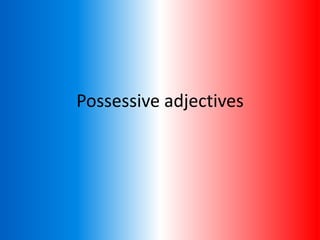Report
Share

More Related Content
What's hot (18)
Adjective, Adverb, and Pronoun Rules and Guideline

Adjective, Adverb, and Pronoun Rules and Guideline
More from kerrie1996
More from kerrie1996 (20)
Possessive adjectives
- 2. These are determiners which indicate what the noun belongs to. The possessive adjective changes depending on whether the noun is masculine, feminine, singular or plural: Singular Plural (Masculine or feminine)Masculine Feminine My Mon Ma Mes Your (informal) Ton Ta Tes His/her Son Sa Ses Our Notre Notre Nos Your (formal) Votre Votre Vos Their Leur Leur Leurs
- 3. Examples: Vous avez vos devoirs? J’habite avec mes parents. Before a feminine noun that begins with a vowel or a silent H, use MON, TON or SON. Mon amour Ton histoire Son amie